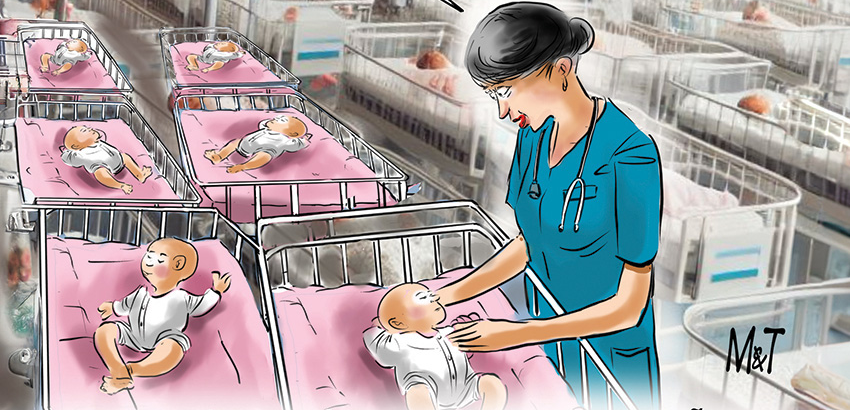By 2034, Vietnam is projected to have 1.5 million more men than women, an imbalance driven by cultural preferences for sons and the belief that a 'complete' family must include both boys and girls, which has led to gender selection practices.
If the current gender imbalance at birth remains unchanged, the gap is expected to grow to 2.5 million by 2059, said Hoang Thi Thom, deputy director of the Vietnam Population Authority under the Ministry of Health.
Thom passed the remark during the Training for Media Professionals on Gender-Biased Sex Selection in Hai Phong City, northern Vietnam on Friday, citing a forecast by the General Statistics Office of Vietnam.
Vietnam has experienced a gender imbalance since 2006, with a sex ratio at birth of 109.8 boys for every 100 girls.
"We have been able to slow down the increasing sex ratio at birth, but it remains high, with the ratio consistently above 112 boys for every 100 girls since 2012," said Thom.
If this trend continues unchecked, the gender imbalance at birth could have serious and unpredictable consequences for society, the economy, and even political stability.
It could affect individuals, families, and communities, degrading social norms and the status of women.
Women may increasingly be seen as commodities, vulnerable to human trafficking and exploitation.
To address the issue, Vietnam has implemented various interventions, including efforts to elevate the role and status of women and girls, promoting gender equality and discouraging sex selection at any stage.
Ha Thi Quynh Anh, senior expert on gender and human rights at the United Nations Population Fund, said that while many families once had large numbers of children -- sometimes seven to eight -- hoping to have a son, this practice has evolved with the advent of modern medicine.
With a limited family size, many now opt for sex selection to ensure at least one son.
|
|
| Hoang Thi Thom, deputy director of the Vietnam Population Authority under the Ministry of Health, speaks at the Training for Media Professionals on Gender-Biased Sex Selection in Hai Phong City, northern Vietnam, November 29, 2024. Photo: D.L. |
“This is a form of gender selection based on bias,” Anh said, emphasizing that the natural ratio is around 102-106 boys for every 100 girls.
A deviation from this ratio leads to gender imbalance.
“We can prevent services offering fetal sex selection, but that is only a superficial solution,” Anh noted.
“The real change will come when gender prejudice, the belief that families must have sons, and the idea that having both a son and a daughter makes a family complete, are no longer ingrained in society."
Nguyen Van Anh, director of the Center for Studies and Applied Sciences in Gender, Family, Women, and Adolescents, attributes the issue to a deeply rooted cultural preference for sons. She explains that this belief drives many families to actively seek to have sons rather than allowing the natural birth process to determine the child's gender.
“Gender stereotypes have been ingrained over hundreds of years, shaping the mindset of many generations,” Van Anh said.
“Changing these stereotypes will require significant time and effort.
“However, we can see that women today occupy a higher status in society and have more opportunities to develop their talents.
“The idea that men must be the family’s pillars is becoming outdated.
“As boys and girls are treated equally, with equal opportunities for growth and work, gender stereotypes will gradually change.
“Gender equality will replace the belief that having a son is essential.
“Ultimately, the true happiness of parents is not defined by the gender of their children, but by the ability to have children and build a family."
Like us on Facebook or follow us on X to get the latest news about Vietnam!

















































